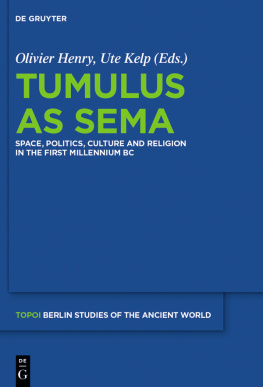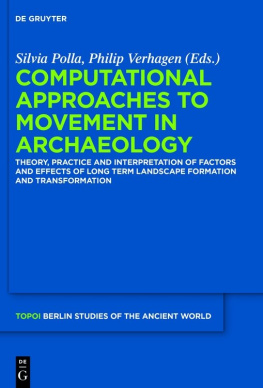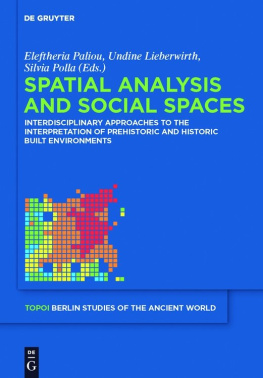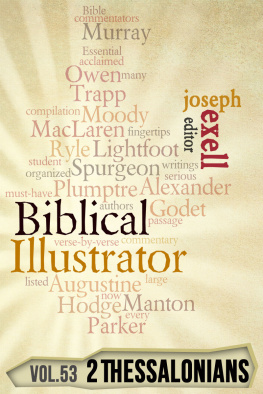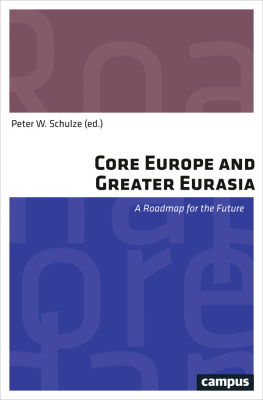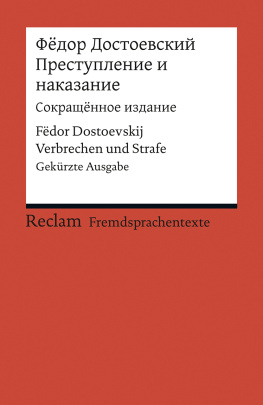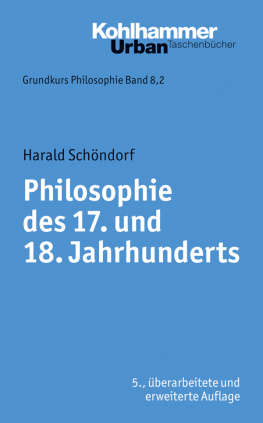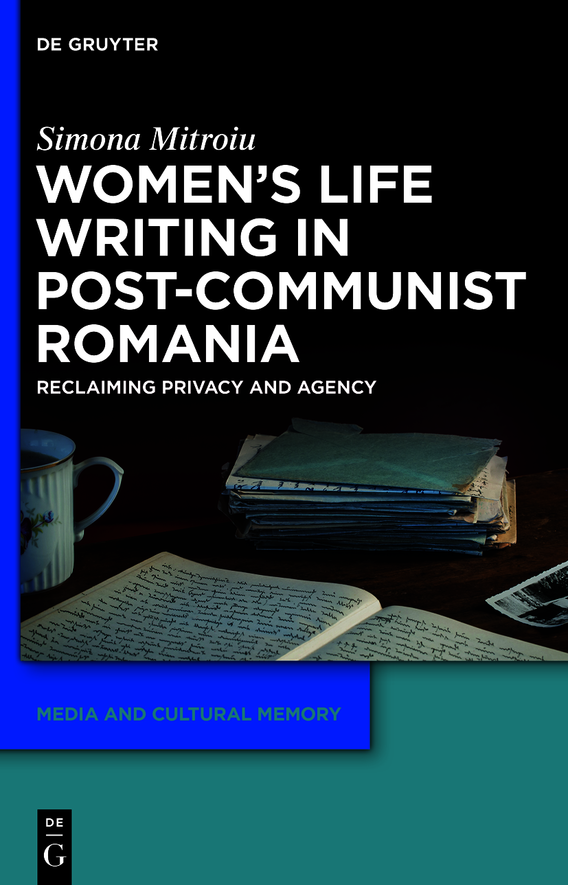Media and Cultural Memory / Medien und kulturelle Erinnerung
Edited by
Astrid Erll
Ansgar Nnning
Volume
ISBN 9783110763874
e-ISBN (PDF) 9783110766530
e-ISBN (EPUB) 9783110766615
Bibliographic information published by the Deutsche Nationalbibliothek
The Deutsche Nationalbibliothek lists this publication in the Deutsche Nationalbibliografie; detailed bibliographic data are available on the Internet at http://dnb.dnb.de.
2023 Walter de Gruyter GmbH, Berlin/Boston
Introduction: Realms of Privacy and Agency
When thinking about the source of inspiration for this book, certain images and narrative projections come to my mind, forming a strange yet familiar mosaic, a sort of family album. One of those images is the shaking body of a young girl hiding in a hole in the ground: my grandmothers father dug a safe place to hide his daughter from the Soviet soldiers marching through the Romanian territories during World War II. But the image of my other grandmothers wrinkled hands tells a different story: after only four years of education, her father decided that too much schooling would do nothing but harm her, so she spent the first harsh decades of the Romanian communist regime raising and educating her six children. One particular story about my husbands grandmother helps me to grasp the communist regimes impact on individual destinies and on Romanian society as a whole: in 1950, while working as a high school teacher, she was accused of being a member of the old bourgeoisie, which was being targeted by the communist regime as the enemy of the people. Her fur collar coat apparently proved her membership to this group. In the end, she lost her teaching position. Finally, the photo of a beautiful young girl with gorgeous, braided hair and a wistful gaze is also included in my family album. Back then, my husbands other grandmother was a talented young writer who wrote poems to her father, a soldier in World War II. He was arrested shortly after the war by the communist authorities and died in prison after being punished for fighting against the liberating Soviet Army on the Eastern Front.
Our mothers entangled stories are also waiting to be told. My mothers life was marked by the impact of the communist regime as she raised one daughter after the other, constantly hoping to avoid getting pregnant again, as getting an abortion at the time almost certainly meant suicide. Her last child survived despite her many attempts to terminate the pregnancy. The details of her attempt to terminate her last pregnancy shocked me, but I look at my youngest sister and am glad that my mother failed. The image of my mother-in-law preparing meals for her only child at five in the morning, as she had no other spare time, provides me with further details about womens everyday lives under communism. The long hours she spent working as a teacher and the endless, sterile school meetings mandated by the authorities for the discussion and glorification of the Romanian Communist Party and its supreme leaders achievements, as well as her personal struggle for material survival, drained her of all her energy and suppressed her creativity, which she was only able to utilize when it came to preparing meals with a minimum of basic ingredients. These are some of the untold stories of thousands, perhaps even millions of women who have experienced abusive regimes at various stages of their lives. What about their inner lives, their joy, hopes and dreams? Many of these life stories are only recounted in the private familial space and have only a minimal impact on public memory discourse through their public reverberations. On the other hand, written stories about the past have a chance to shape memory discourse, to challenge it, and to enrich it by showing the many ways that past events have been experienced and understood.
I spent my early childhood in communist Romania, and, during the post-communist transition period, I first began hearing personal stories of the challenges that women faced living under communism. During my student years, I learned that my older colleagues were afraid to have children in the 1980s due to social hardship and a lack of basic products, including baby formula. Little by little, I learned from friends and acquaintances what it meant to be a woman during communism, listening to dozens of stories, some nostalgic, some tragic, some both at once. I learned about the strict population control, the challenges of raising children or of choosing not to have any, of being both professionally active and fully involved in domestic life, and also about differences, advantages, and disadvantages. From different perspectives, the life narratives I heard revealed to me womens struggles to gain control over their lives and the communist regimes dominant representations of womens role and place in society. The complex connections between personal life stories and the political and social influence on self-narration and self-expression continue to fascinate me. How do women position themselves in relation to the communist system in their life writing? And how did the social and political regime influence how they revealed themselves in life writing? These are some of the questions in the background of this volume, which indicate that the topic of womens life writing in East Central Europe still requires significant discussion in relation to past socialist regimes. This book focuses on how women narratively express the self in life writing as a means of dealing with the past and recollecting their life experiences. What constitutes communist experience, and who is allowed to present it? My analysis of womens life writing reflects the complexity of the process of remembering and the connections between self-expression, memory, privacy, and autobiographical narrative. In speaking about womens experiences of the communist regime, I adopt an understanding of experience in this book as something lived by the individual subject and defined in her terms an experience reconstructed by the protagonist, and transmitted to others (, 14). Therefore, in my readings of Romanian womens life writing, I will pay close attention to the impact that the regime had on womens lives as reflected through their self-narration in life writing. I will explore womens responses to political and social events and to the invasion of their private lives. My close analyses of how they wrote their life narratives will investigate the impact of prevailing social norms and power relationships on womens memories.
I use the concept of self-narration as it was coined by Arnaud , 662).
This chapter introduces the general conceptual framework of my research into realms of privacy. It provides an overview of my survey of the impact that abusive regimes of power had on womens lives and on the way that they expressed their selves by analyzing their life writing through the lenses of privacy and agency. I reflect on the connection between the self and privacy, and I propose the concept of privacy of the self to designate the forms that privacy takes when this bond between the self and privacy is affected by power relations, in this specific case those related to the Romanian communist regime. The privacy of the self means a realm of privacy created by the self, envisioned and constructed through specific acts, despite the abusive regimes attempts to control various aspects of citizens private lives, thereby demonstrating personal agency. Throughout this book, I will analyze the privacy of the self in terms of self-narration, self-expression, and authors reflections on how their autobiographical narratives have been shaped by abusive regimes of power as they remember the communist past in life writing. The designation East Central Europe is used to describe former communist regimes and the collapse of those regimes between 1989 and 1991 (). This volume examines the impact of the communist regime on Romanian womens life writing by looking at the publications printed in Romania in the post-communist decades (19902020), although it also offers several examples that highlight attempts made by those who escaped abroad to testify about the horrors they experienced in communist Romania in their life writing publications.



